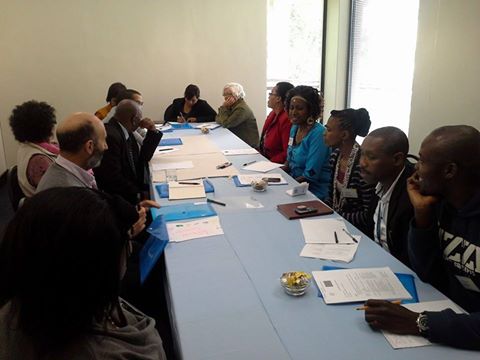National Colloquium on Health Committees

A national colloquium was held in Cape Town on 29th September 2014 to consider the role of Health Committees as vehicles for community participation in strengthening the health system in South Africa.
In total, over 100 participants from all over the country considered inputs from a diverse range of speakers, including members of health committees in the W and E Cape, NGOs involved in working with health committees, and health and legal researchers.
The keynote address was given by Ms Jeanette Hunter, DDG for Primary Health Care in the National Department of Health who sketched the National Department of Health's perspective on community participation and the role of clinic committees.
Participating in the debates were health officials, NGO workers, researchers, health committee members and delegates from other African countries attending the Global Health Systems Research conference.
The meeting, funded by the European Union Mission to South Africa, came up with the following resolutions:
RESOLUTIONS
- Given the long delay in enacting the provisions of section 42 of the National Health Act, we call on Provinces to pass legislation as a matter of urgency to recognize the roles and functions of Health Committees as critically important vehicles for community participation in health.
- We call on the Minister of Health to table the status of Health Committees at the National Health Council to give direction and create an enabling environment for the adoption of provincial legislation on Health Committees.
- Civil Society demands that government should provide the necessary resources (human resource support, training, reimbursement of costs and physical infrastructure as needed) for health committees to function optimally because it is obliged to do so by The National Health Act (NHA)
- In developing regulations on health committees there must be participation by health committees and communities in the process.
- There should be a tiered structure for community participation from facility to national level allowing for 2-way communication.
- The Department of Health, when finalizing criteria for defining a functional health committee as part of evaluating health facility performance in the Ideal Clinic programme and in the work of the Office of Standards Compliance, must include participation by ward councilors and facility managers in their health committees.

Delegates deliberating in group discussions
The meeting resolved to pursue the establishment of a National Network on Health Committees to take forward the resolutions and some of the outstanding work required. The areas in which more work was identified as needed included:
- The extent of roles and responsibilities and particularly that of ward councilors in the Health Committees;
- How best to support Health Committees taking on fundraising roles;
- Inter-sectoral interventions needed to address health that require cooperation of other government department;
- Political buy-in from elected leaders at local, provincial and national level;type="a"
- Participation as a Human Rights issue;
- Monitoring and Evaluation systems for Health Committees to help confirm what is a functional Health Committee;
- Legal action to ensure Health Committees are appropriately recognized
- Mass mobilization in alliance with other civil society organisations in health.
The National Health Act first provided for recognising Health Committees when adopted in 2003. The consensus at the meeting was that “19 years is way too long.” We need to see urgent progress on Health Committees.
Participants at a National Colloquium on Health Committees hosted by the Learning Network for Health and Human Rights, 29th September 2014, Cape Town.
For further details, contact Professor Leslie London, School of Public Health and Family Medicine, University of Cape Town, 0791896368; email leslie.london@uct.ac.za or Anita Marshall at anita.marshall@uct.ac.za.
